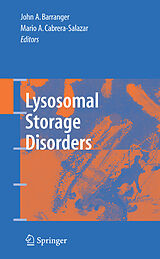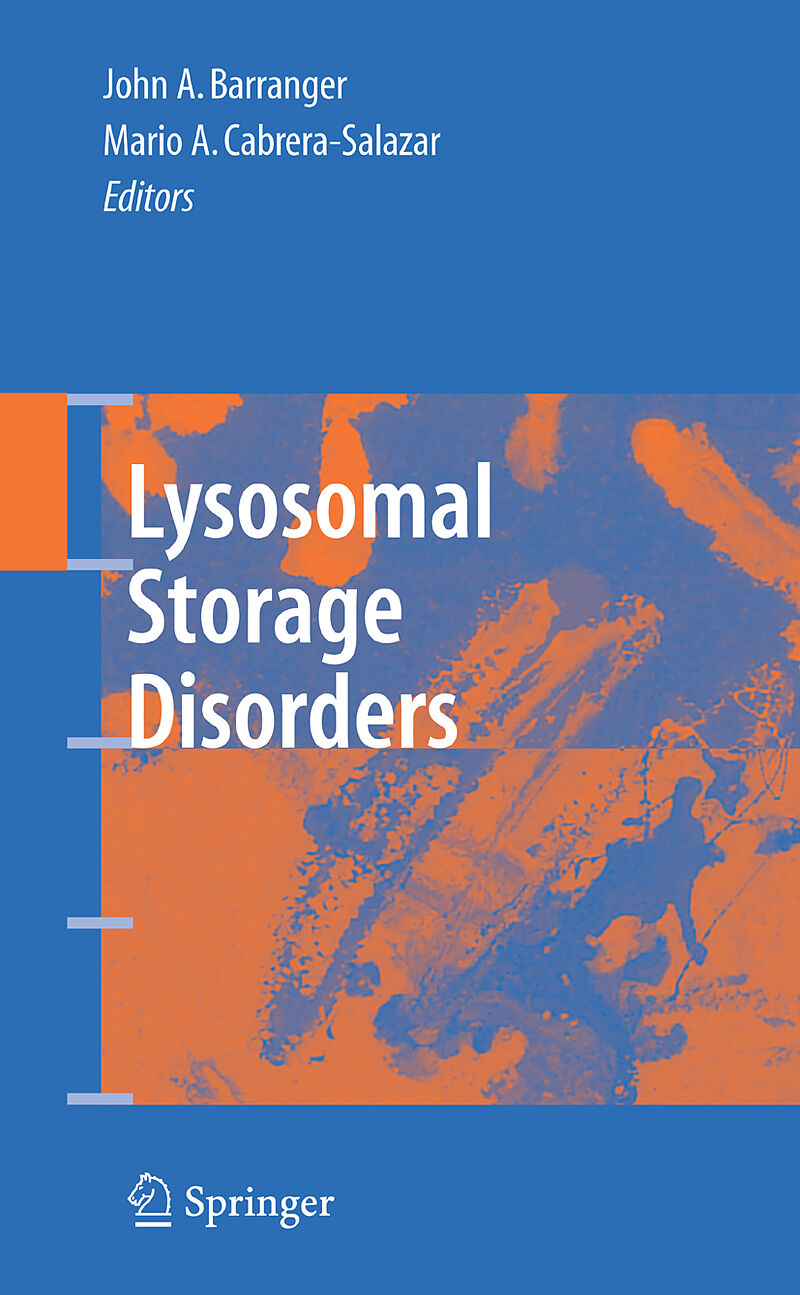Lysosomal Storage Disorders
Einband:
Fester Einband
EAN:
9780387709086
Untertitel:
Englisch
Genre:
Medizin
Herausgeber:
Springer US
Auflage:
2007
Anzahl Seiten:
584
Erscheinungsdatum:
01.10.2007
ISBN:
0387709088
This book describes the nature of the lysosomal dysfunction and diseases as well as potential future treatments and therapies. This is an invaluable resource for researchers in biochemical and molecular genetics, enzyme therapy, and gene transfer.
Scientific progress has been rapid in lysosomal biology during the last six decades. Its application to human disease is nothing less than spectacular. In no other group of disorders has knowledge and clinical utility progressed so speedily. Recall that the organelle was described in just 1955. Since then, the biochemical alterations and storage materials were described, the enzyme deficiencies discovered, the gene coding of these glycoproteins cloned and thousands of mutations defined. These advances have resulted in highly improved diagnosis for more than 50 diseases. For five diseases, including the most common lysosomal storage disorder, molecular therapy is a reality, extremely effective and very safe. This higher plateau of medical approaches to human disease is something to which all translational scientists aspire and only a few actually witness. The relief of pain and suffering is a tribute to the ideas and work of many dedicated investigators. Much of that work is presented in this text. Despite our ability to treat some of these diseases through enzyme replacement therapy (ERT) and, accurately define different diseases that look alike, there is much to be learned about lysosomal disease. With each step up the barrier to knowledge, a new point of view is attained, a fresh perspective. Much is seen more clearly and many allegories of the cave are dispelled forever. Yet, our new view demands a new vision drawing us to find better definitions of what we see. This is how it has been with lysosomal diseases.
Autorentext
John A. Barranger, M.D., Ph.D., is a tenured professor in the departments of human genetics, molecular genetics and biochemistry, and pediatrics at the University of Pittsburgh. He is also director of the Human Gene Therapy Applications Laboratory, the Center for the Study and Treatment of Jewish Genetic Diseases, and the Comprehensive Gaucher Disease Treatment Center. Additionally, he is co-director of the Human Gene Therapy Center. Previously, Dr. Barranger was a clinical associate at the National Institutes of Health (NIH), where, from 1976 to 1978, he served in the clinical investigations and therapeutics section, Developmental and Metabolic Neurology Branch (DMNB), National Institute of Neurological and Communicative Disorders and Stroke. He ultimately became chief of the molecular and medical genetics section of the DMNB and associate branch chief. Dr. Barranger received a doctorate and medical degree from the University of Southern California Los Angeles, and completed an internship and residency in pediatrics at the University of Minnesota. Dr. Barranger has devoted his professional career to the study of inherited metabolic diseases, particularly lysosomal storage disorders. His research interests include biochemical and molecular genetics, enzyme therapy, gene transfer, and models of genetic disease. As a result of his investigation of the structure of glucocerebrosidase and receptors on macrophages, Dr. Barranger developed successful enzyme replacement therapy for Gaucher disease, an inherited, potentially lethal lysosomal disorder that affects more than 10,000 people in the United States. This therapy received Food and Drug Administration approval in 1991 and serves as a treatment model for more than 50 related lysosomal storage disorders. Currently, Dr. Barranger is focused on developing models of inherited diseases to study their pathobiology and treatment by enzyme and gene therapy.
Included among Dr Barranger's honors are the March of Dimes Health Career Award, United States Public Health Service Commendation Medal, Arthur S. Flemming Award and the Scientific Achievement Award of the National Gaucher Foundation. In addition to consulting for government and industry, Dr Barranger is a member of numerous professional organizations, including the American Society of Biochemistry and Molecular Biology, American Society of Human Genetics, Society for Inherited Metabolic Disorders, and the Society for Pediatric Research. Mario A. Cabrera-Salazar, MD is a Staff Scientist at Genzyme Corporation in Framingham. MA. He is involved in the development of enzymatic and gene therapies for lysosomal storage disorders and for neurodegenerative diseases in the department of Genetic Disease Science.
Klappentext
Lysosomal Biology and Storage Disorders John A. Barranger and Mario A. Cabrera-Salazar The knowledge of lysosomal biology and the consequences of its dysfunction have increased dramatically in the past 60 years. Research of these disorders has moved from diseases with unknown etiology to disorders with clear and defined pathophysiology and some of them have benefited from the development of disease specific therapeutics. Lysosomal Biology and Storage Disorders describes the nature of the diseases, the historical evolution of the field and future perspectives for the treatment of these clinical entities. Organized as a textbook, Lysosomal Biology and Storage Disorders describes the nature of lysosomal dysfunction, the synthesis and targeting of lysosomal enzymes and the implications of the targeting mechanisms for the development of new therapies. Disease specific chapters provide thorough reviews of the clinical features of lysosomal storage disorders, their molecular basis and the commercial or experimental therapeutic approaches sought in this area. Lysosomal Biology and Storage Disorders will be attract to all researchers in biochemical and molecular genetics, enzyme therapy, gene transfer, and others concerned with the models of genetic disease. This book is dedicated to patients affected by Lysosomal Storage Disorders, and especially to the National Gaucher Foundation (USA) and the Colombian Association of Patients with Lysosomal Storage Diseases (ACOPEL for its Spanish Acronym). Both organizations will share in the sales of this book. About the Editors: John A. Barranger, M.D., Ph.D. is a Professor in the departments of human genetics, molecular genetics and biochemistry, and pediatrics at the University of Pittsburgh School of Medicine. He has also served as director of the Human Gene Therapy Applications Laboratory, the Center for the Study and Treatment of Jewish Genetic Diseases, and the Comprehensive Gaucher Disease Treatment Center in this institution Mario A. Cabrera-Salazar, MD is a Staff Scientist at Genzyme Corporation in Framingham, MA. He is involved in the development of enzymatic and gene therapies for lysosomal storage disorders and for neurodegenerative diseases in the department of Genetic Disease Science.
Inhalt
From Lysosomes to Storage Diseases and Back: A Personal Reminiscence.- Lysosomal Biogenesis and Disease.- The Concept of Treatment in Lysosomal Storage Diseases.- Complex Lipid Catabolism.- Retroviral Vectors for Gene Therapy.- Adenovirus in Gene Therapy.- Setting Back the Clock: Adenoviral-Mediated Gene Therapy for Lysosomal Storage Disorders.- Adeno-Associated Viral-Mediated Gene Therapy of Lysosomal Storage Disorders.- Herpes Simplex Virus Vectors for Gene Therapy of Lysomal Storage Disorders.- Gene Therapy of Lysosomal Storage Disorders by Lentiviral Vectors.- Substrate Reduction Therapy.- Newborn Screening for Lysosomal Storage Disorde…

Leider konnten wir für diesen Artikel keine Preise ermitteln ...
billigbuch.ch sucht jetzt für Sie die besten Angebote ...
Die aktuellen Verkaufspreise von 6 Onlineshops werden in Realtime abgefragt.
Sie können das gewünschte Produkt anschliessend direkt beim Anbieter Ihrer Wahl bestellen.
Loading...
Die aktuellen Verkaufspreise von 6 Onlineshops werden in Realtime abgefragt.
Sie können das gewünschte Produkt anschliessend direkt beim Anbieter Ihrer Wahl bestellen.
| # | Onlineshop | Preis CHF | Versand CHF | Total CHF | ||
|---|---|---|---|---|---|---|
| 1 | Seller | 0.00 | 0.00 | 0.00 |
